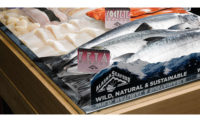Walk through a grocery store, and it is increasingly likely that you will see shoppers studying their purchases more than ever before. If they’re not reading the ingredients list, they’re comparing the nutritional labels of similar products to find out what’s best for them. Buzzwords like “natural” and “organic” have become strong selling points, and now it is possible to find a natural or organic equivalent to practically every item in the supermarket. Mintel estimated that the market for organic and natural foods and beverages would top $7 billion in 2008.
For the last several years, the natural and organic meat markets have enjoyed double-digit growth, as consumers had shown a willingness to spend a little more to get food that they perceive to be higher quality or healthier. While recent times have forced many consumers to take a closer look at their buying habits, there is still a steady market for higher-end meat items.
“There has been some softening, but overall the sales are still growing, [just] more slowly than in past years,” says Mack Graves, CEO of Panorama Meats Inc. Panorama sells grass-fed, organic beef to independent retail grocers and Whole Foods stores in the western United States. “The grass-fed products and organic in particular have seen unabated growth and will continue as more notice is taken through different venues, with the movie Food Inc. being the most recent.”
Located in Blackwood, N.J., Watson’s Quality Food Products Inc. produces a variety of ready-to-eat meats and other products, and over the last year, it has increased its production of natural, antibiotic-free meats from 20 percent of all production to 35 percent.
“About eight or nine years ago when the antibiotic-free movement was coming around, we were able to find ourselves competitive in that area. It was a nice little niche for us,” says Darren Buseman, QA manager and director of developing accounts/products. “It takes a lot more work and a lot more custom programs, but there’s a lot of room for us to profit from it, too.” He estimates that natural meat products could be half of the company’s business within the next few years.
Watson’s originally started as a turkey plant but struggled while competing with the large-sized turkey processors. The company has continued to diversify and has found its niche in processing everything from breakfast sausage and deli meats to further-processed products for foodservice and meal kits. Natural poultry products are the company’s main driver in the niche, but the company processes pork and beef as well and is starting to process some boutique lamb products.
Buseman says that the company hasn’t seen any slowdown in natural products, especially in the retail market.
“Customers are still willing to pay the extra money for a higher-quality product,” he notes. “They are a lot more sensitive, more educated and definitely a wealthier customer that wants to know every single little detail that’s in each spice and each process, but that’s expected.”
By the numbers
Given the number of products bearing “natural” or “organic” labels or descriptions, the demand for healthier products is not decreasing. A recent study by the marketing agency Pavone and the marketing research firm Leap showed that more than three-quarters of respondents said they’d prefer to purchase organic and all-natural goods if comparably priced with other leading brands.That statement does pose a challenge for processors and retailers alike, as the cost of producing natural or organic goods is higher than regular products. A further complication is that just putting “All Natural” on a label doesn’t cut it with today’s consumers.
“Consumers are smart and getting smarter, especially in this economy,” said Pavone President Michael Pavone. “They’ve been inundated with products claiming to be all natural or organic, so they’re naturally skeptical. It’s up to manufacturers to explain very clearly why their product meets certain criteria and why consumers should believe it.”
The study, which took place in April, 2009 and polled 353 adults who identified themselves as the primary shopper, showed that shoppers can tell the difference between process-based organic foods – those produced without the use of chemicals, contain no artificial ingredients and are minimally processed – and ingredients-based all natural products – foods that contain no artificial ingredients.
Overall, organic foods faired slightly better in the study than all-natural products. In terms of health benefits, 79 percent agreed that organic foods are “better for my health” than non-organic foods, versus 71 percent with the same opinion of all natural foods.
“The best news is that the desire to purchase remains high,” said Pavone, “and shoppers remain open to trying new things – as long as it doesn’t break the budget.”
A Mintel report released in 2008 was less optimistic, stating that the slowing American economy would lead to a slowdown in growth for natural and organic products.
“Across the board, Americans are spending less and ‘organic versus traditional’ is a decision many people are thinking about carefully," commented Marcia Mogelonsky, senior analyst at Mintel.
Mogelonsky noted the growth of private-label organic and natural products as a threat to branded items, but their growth does represent another area of opportunity for processors looking to get involved in the niche. Mintel’s Global New Product Database (GNPD) tracked over 540 new private label organic foods in 2007, a massive increase from the 35 new products seen in 2003.
High standards
The fact that more companies are trying to enter the natural and organic market has actually bolstered Watson’s business, as it’s able to adjust its operations to take on natural meat processing better than larger companies can. Several of its customers are larger processors who wanted to get into the natural market.“The larger companies can’t go out and just change their whole line to produce an antibiotic-free product,” Buseman says. “Naturally we fall into that niche where we can adjust our schedule by the week or by the day and run it effectively to go with what’s on out lines.”
The company counts among its customers retailers like Whole Foods and Wellshire Farms, which offers a variety of fully-cooked natural items like breakfast sausages. Another growing business is club stores like BJ’s and Costco, which are offering more and more natural products, Buseman says.
“I would say out of all our growth, half of that is probably through club stores that are looking for a separate brand that is a premium to what they already have there,” he adds. “I think Costco set the benchmark, but BJ’s is catching up.”
When developing a natural-meat program for a company like Whole Foods, a processor must complete a stringent audit, and possibly more than one.
“Every company has to have their third-party food safety audit that is linked to Whole Foods,” Buseman explains. “You can’t just do your own audit and submit it. They always have their eyes on that, and then they have their own team that comes in and does a separate audit, where they take your third-party [audit] and confirm it.”
The standards for organic products are even stricter, with much more traceability that stretches back to the parentage of the animals and the pasture where they were fed. The cost for organic product is also higher than natural products. Nevertheless, Panorama made the decision to convert from both a natural and organic grass-fed beef company to a wholly organic beef company.
“It narrowed our focus but improved our profitability,” says Graves. Panorama does not do any of its own processing, and he says that any processors who work with Panorama must be certified organic or can become so. Furthermore, he says, “They must also have an understanding attitude, not condescending, of natural and organic agriculture. They do not necessarily have to do only natural and organic processing, but they must be able to prove that they can keep the organic products separate, plus pass an annual organic inspection.”
Graves says that Panorama looks for several qualities in a co-packer, including those with a history of good manufacturing practices, a thorough HACCP plan, E. coli interventions, good yields and competitive pricing.
Graves says that Panorama will continue to seek out Whole Foods stores to provide with locally grown organic grass-fed beef. When that is not available, the company will seek out other retailers and foodservice operators, but he believes that the natural food stores will remain the dominant players in the market.
“The mainstream players can’t ignore the sales success for the natural foods players and will want a piece of the niche,” Graves says. “So they will continue to dip their toe into the natural/organic meat arena, but without a visceral belief and commitment that natural food stores have, they will not be as successful.”



Report Abusive Comment